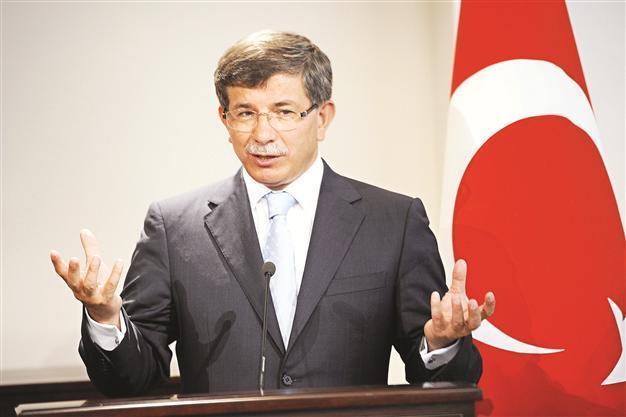Turkey wants new Cyprus solution bid
MURAT YETKİN

On the day that Turkish Foreign Minister Ahmet Davutoğlu made a statement about the possibility of a two-state solution in Cyprus, that is March 26, as the first Turkish official to voice that after some 10 years, he had already signed and sent eight letters to demand a new solution initiative on the island of Cyprus, with its Greek-ruled south sector in a deep economic crisis for almost two weeks now. Davutoğlu’s letters were addressed to Ban Ki-moon, the United Nations secretary-general; the foreign ministers of the U.S., Russia, U.K., France and China, the five permanent members of the U.N. Security Council; Germany, the unnamed strategic partner of the U.N.-P5; and Greece, Turkey’s natural partner and rival on the Cyprus problem.
The letters, according to Turkish Foreign Ministry sources who answered Hürriyet Daily News questions, did not mention the possibility of a two-state solution (that is, actually making the current situation following the Turkish military intervention in 1974 official) if the Greek Cypriot government tries to abuse the economic crisis as a pretext to claim sovereignty over the reportedly rich oil and gas resources discovered around the island, both south and north. But it clearly stated the lines used in a press release on March 23 (put on the ministry’s website on a Saturday evening), as the final sentence; “Turkey and the Turkish Cypriots” were “ready to work with Greece and the Greek Cypriots.”
It was interesting in the sense that Turkey does not recognize the Greek government-run Republic of Cyprus, as long as it claims sovereignty over the Turkish government-run northern territory, divided by a U.N.-controlled Green Line. A U.N.-sponsored referendum had been carried out in 2004 for the reunification of the island, which Turks approved but Greeks did not, only to be rewarded by European Union membership, which really drove the Turks crazy as the main reason for declining sympathy for the EU in the country. By taking Greek Cyprus in, the EU had not only imported a major border problem into its system, but also a weak and vulnerable economy as everyone can see with the outcome nowadays.
Now the Turkish foreign minister is saying that if the Greek Cypriots would take the Turkish Cypriots as their political equivalents, not minority representatives, a four-party solution could be reached, as in the establishment of the Republic of Cyprus in 1960 when Turkey, Greece and the U.K. had worked out a solution; mainly “a new state of affairs” for the island.
The first answer to Davutoğlu’s letters came from his Greek partner, Dimitris Avramopoulos, on March 28 and similarly put on the website of the Foreign Ministry of the Hellenic Republic. In this rather long answer, Avramopoulos states that 1974 is the main reason for the problems, softly warns against possible exploitation of the desperate situation the Greek Cypriot government is in and declines a four-party meeting but does not close doors by acknowledging Ankara’s “willingness” to solve the Cyprus issue.
Will Turkey’s initiative to start a new round of diplomacy indeed turn into traffic for a “new state of affairs”? It is not clear yet. But given the already heated-up state of the waters of the East Mediterranean with Egypt and now Syria, and given the new state of affairs between Turkey and Israel with the possible energy cooperation outcomes, the economic crisis in Cyprus might be used for good, for a lasting solution for both the Greeks and Turks living on the island.
 On the day that Turkish Foreign Minister Ahmet Davutoğlu made a statement about the possibility of a two-state solution in Cyprus, that is March 26, as the first Turkish official to voice that after some 10 years, he had already signed and sent eight letters to demand a new solution initiative on the island of Cyprus, with its Greek-ruled south sector in a deep economic crisis for almost two weeks now. Davutoğlu’s letters were addressed to Ban Ki-moon, the United Nations secretary-general; the foreign ministers of the U.S., Russia, U.K., France and China, the five permanent members of the U.N. Security Council; Germany, the unnamed strategic partner of the U.N.-P5; and Greece, Turkey’s natural partner and rival on the Cyprus problem.
On the day that Turkish Foreign Minister Ahmet Davutoğlu made a statement about the possibility of a two-state solution in Cyprus, that is March 26, as the first Turkish official to voice that after some 10 years, he had already signed and sent eight letters to demand a new solution initiative on the island of Cyprus, with its Greek-ruled south sector in a deep economic crisis for almost two weeks now. Davutoğlu’s letters were addressed to Ban Ki-moon, the United Nations secretary-general; the foreign ministers of the U.S., Russia, U.K., France and China, the five permanent members of the U.N. Security Council; Germany, the unnamed strategic partner of the U.N.-P5; and Greece, Turkey’s natural partner and rival on the Cyprus problem.